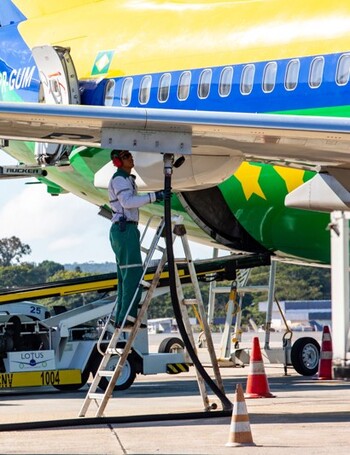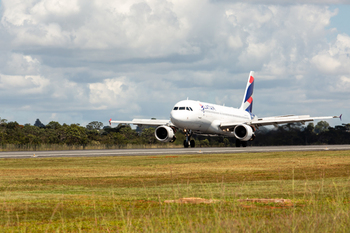Shaping aviation with climate-neutral alternative fuels
Project details
Title: Climate Neutral Alternative Fuels (ProQR)
Commissioned by: German Federal Ministry for the Environment, Nature Conservation and Nuclear Safety (BMU)
Country: Brazil
Lead executing agency: Brazilian Ministry of Science, Technology and Innovation (MCTI)
Overall term: 2017 to 2023

Context
The demand for fuel in Brazil’s transportation sector is rising annually by around five per cent. In the aviation sector, this growth is even greater as airlines are increasingly offering new flight connections to remote regions of the country. This accelerates climate change and results in huge logistical challenges for fuel supply.
The aviation industry is committed to climate-neutral growth, which will only be achievable in the medium term through the use of non-fossil fuels. Even with an increase in the production of ethanol and biodiesel, biofuels can only play a limited role in satisfying the growing demand.
Objective
Brazil has created an internationally usable reference case for the production and application of power-to-liquid sustainable fuels for aviation and other transport sectors without potential for electromobility.

Approach
Wind and solar energy is one possible solution for climate-friendly air transport. Brazil is ideally placed to meet the requirements for this. There is ample sunlight across the country for photovoltaic systems, and many regions have constant wind or other climate-friendly, low-cost renewable energy sources.
Small decentralised power plants that produce fuel for aviation from renewable electricity not only contribute to climate-neutral aviation, but can already produce economically in many remote locations.
The project will support the planning, financing, construction and operation of a demonstration plant in Brazil. In this process, it will actively integrate various Brazilian ministries, authorities, universities and other public institutions as well as authorities and companies to continue developing the technologies for climate-neutral fuels. In the future, plants of this kind are to be produced in series and used at extremely remote airports in the Amazon region. Based on the lessons learned here, meaningful figures, data and facts will be delivered for the international debate on the shift to green transport.
Despite the effects of the COVID-19 pandemic on the aviation sector, the implementation partners support projects within the pilot phase component even more strongly than previously. In line with the international efforts, they are committed to a sustainable recovery of air transport.
The Brazilian implementation partners are the Ministry of Science, Technology and Innovation (MCTI) and the National Agency of Petroleum, Natural Gas and Biofuels (ANP). The Deutsche Gesellschaft für Internationale Zusammenarbeit (GIZ) GmbH and the German Aerospace Center (DLR) are involved on the German side.
Results
Under real conditions, the project proves that the production and use of electricity-based renewable fuels is economically feasible. It therefore harnesses new potential for air transport and other transport sectors without the potential for electrification, such as shipping.
With its results, the project makes an important contribution to the climate neutrality of the Brazilian and global transport industry.
Latest update: October 2020